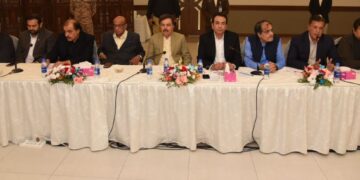Muzaffarabad,.: As a part of its continuous efforts to impart pedagogical skills to teachers to empower them to improve the teaching outcomes, Oxford University Press (OUP) organized two symposiums for school teachers on the theme ‘21st Century Learning Skills: Enabling, Nurturing, Fostering’.
Conducted by OUP authors and trainers from Pakistan and abroad, the objective of the symposiums was to explore the ways in which teachers can effectively harness, grow, and sustain among students the 21st century skills—critical thinking, creativity, communication, and collaboration—which are a pre-requisite to function in the global knowledge economy.Around 200 teachers from across Pakistan attended the symposiums which provided the participants and trainers a valuable platform to brainstorm, exchange ideas, experiences, and best teaching practices.
Productive sessions were held showcasing many new Oxford international textbooks and resources developed for primary, secondary, and O levels. Innovative methodologies and tools for the teaching of Science, Mathematics, English, History, Geography, and ICT skills were discussed. A session dedicated to the building of literacy and numeracy skills among pre-primary students, and another one highlighting the importance of quality assessment tools were also organized.
The trainers—who included Ron Pickering, Judith Bradshaw, Michael Pearson, Margaret Thomson, Sherwin Rodrigues, Abdul Haseeb, Nasreen Iqbal, Arwa Khuzaima, and Zahra Sethi—spoke about useful techniques to enable teachers to maximize the learning goals of the curriculum using OUP resources.
The focus in this year’s symposiums was on the introduction of STEAM education in schools which is based on blended learning solutions offering an interdisciplinary, problem-solving, project-based learning approach aligned with the development of 21st century skills.
An informative presentation was made on Dragonfly Readers, a new graded reading series launched by OUP featuring fiction and non-fiction, written by Asian authors, and infused with Asian culture, themes, and values. The series is designed to help young learners develop their English reading and comprehension skills. An introduction was also made to Oxford Reading Buddy, an innovative digital reading service accompanying the Dragonfly Readers.
The participants were introduced to OUP’s first-of-its-kind initiative of ‘Educators’ Facilitation Programme (EFP)’ which offers teachers quality professional learning modules to develop their teaching skills. The programme provides teachers the flexibility of completing all the modules under different topics or stand-alone modules only to meet their specific training requirements.
A panel discussion on ‘The Changing Scenario of Education in Pakistan’ took place featuring Arfa Sayeda Zehra, Ameena Saiyid, Baela Raza Jamil, and Shahid Siddiqui as speakers and Harris Khalique as the moderator.
In his welcome remarks, Arshad Saeed Husain, Managing Director, OUP Pakistan, said “The focus of teaching/learning practices must move from Content-based Learning to Skills-based Learning. And the most important skill is learning how to learn and constantly keep learning. Thus, yesterday’s teacher-centred classrooms must give way to pupil-centred experiential learning environments and practices.”
While addressing the symposium delegates, Ameena Saiyid, Chair, OUP Pakistan, highlighted that the purpose of this year’s Teachers’ Symposiums was to discuss ways to equip today’s students with learning skills required to make them succeed in the real world. To this effect, she added, OUP’s learning materials are designed to cultivate the students’ set of skills and enable them to become lifelong learners who can face the challenges of the 21st century with confidence.
Dr Baela Raza Jamil, Director of Programmes, Idara-e-Taleem-o-Aagahi (ITA), presented the keynote address at the symposium.



















